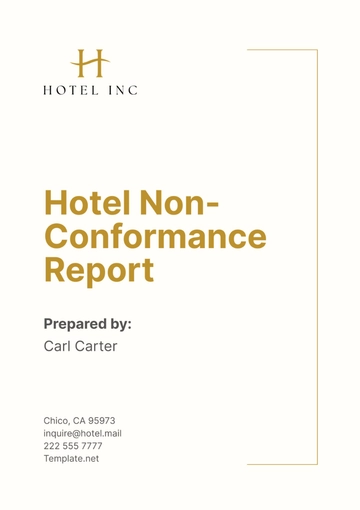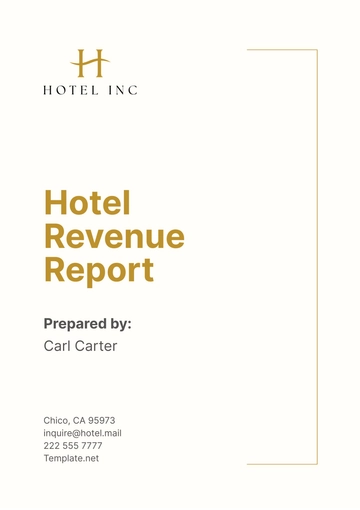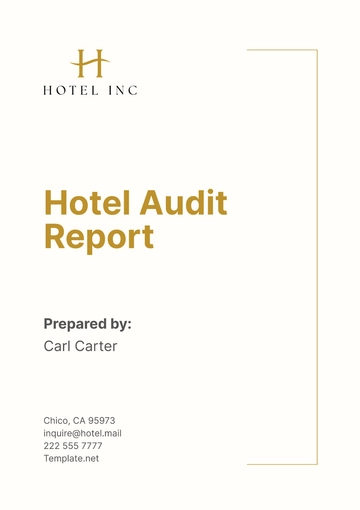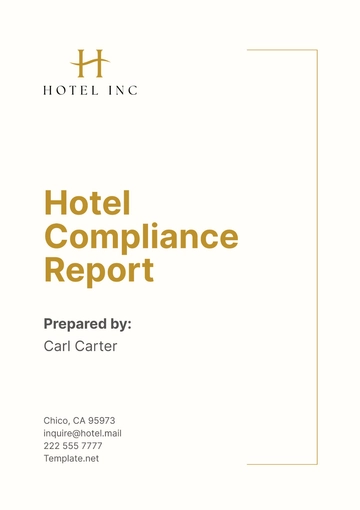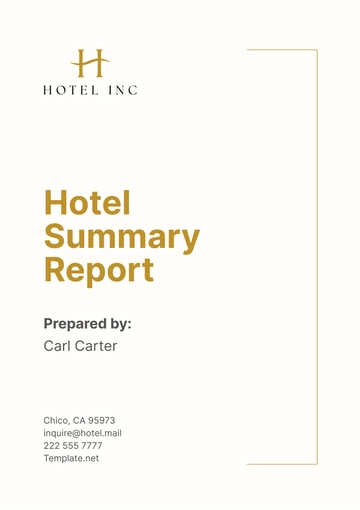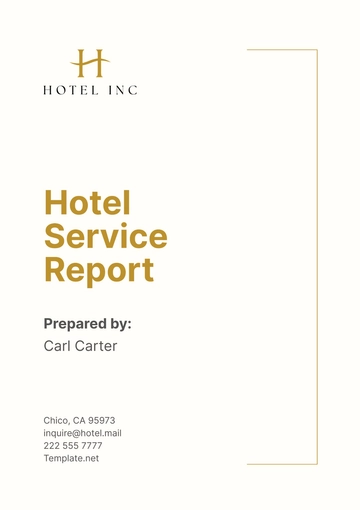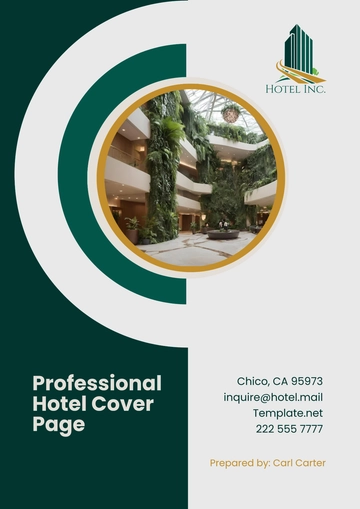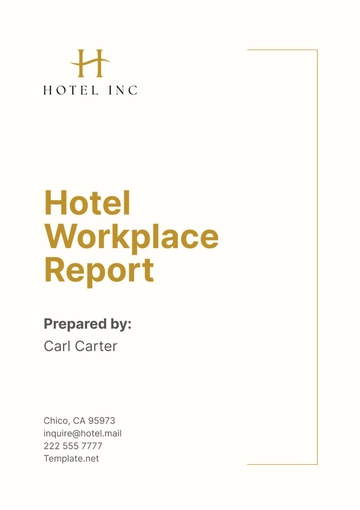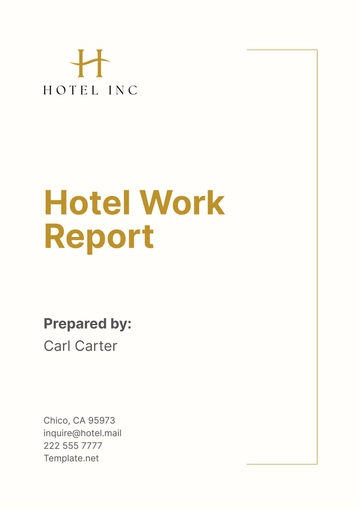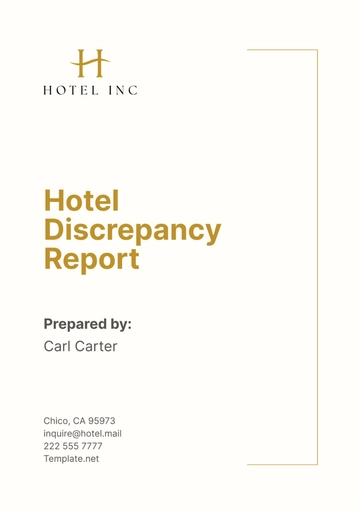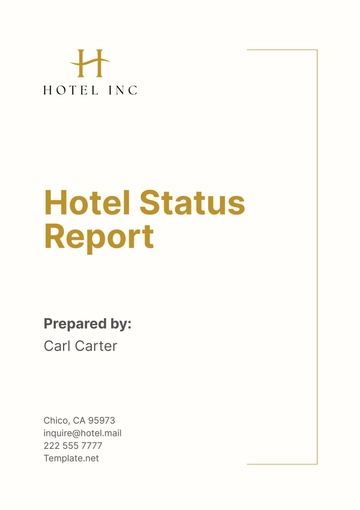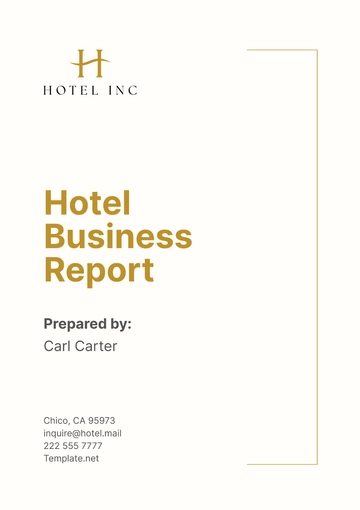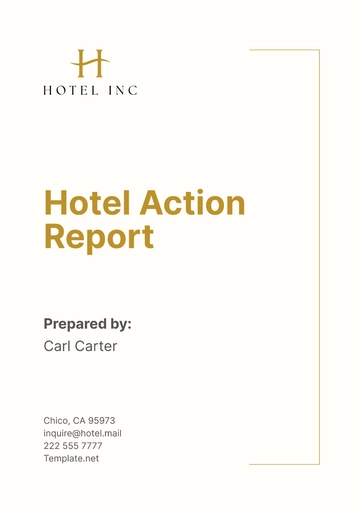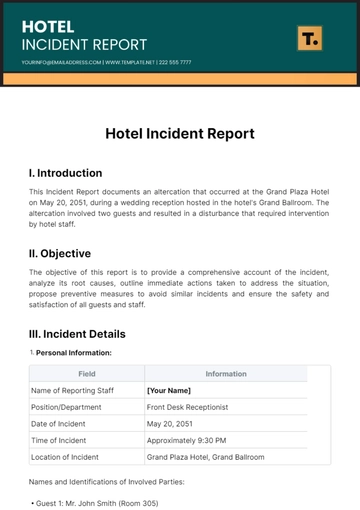Free Hotel Audit Report
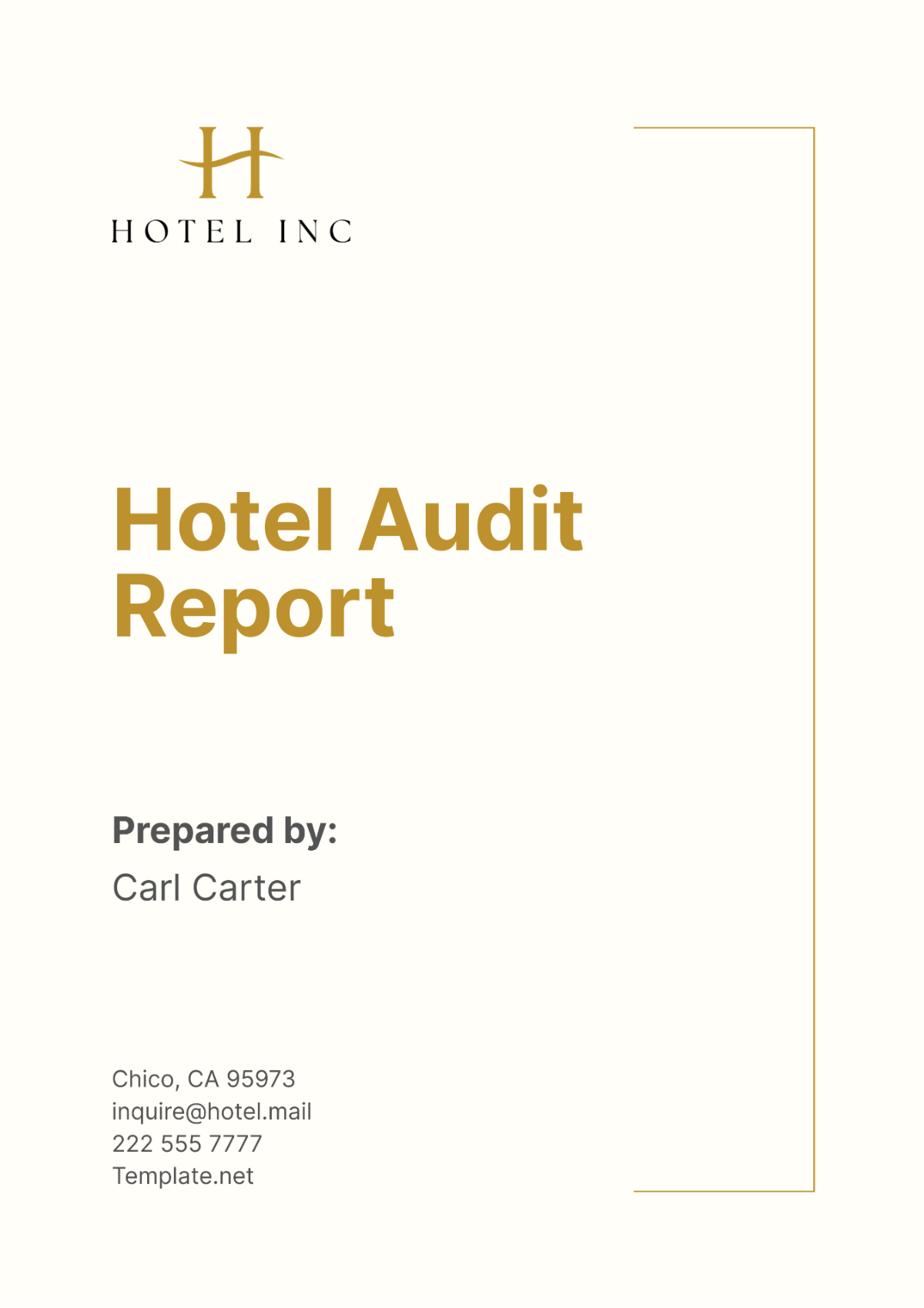
I. Executive Summary
The Hotel Audit Report provides an in-depth analysis of [Your Company Name]'s operations, focusing on key areas such as financial management, guest services, and regulatory compliance. The audit aimed to identify strengths and areas for improvement to enhance the hotel's overall performance and compliance with industry standards and regulations.
Key findings from the audit include opportunities to improve cost management practices, streamline guest service processes, and enhance regulatory compliance measures. Recommendations include implementing cost control measures, enhancing staff training programs, and strengthening internal controls to mitigate risks.
Overall, the audit opinion is that while the hotel demonstrates strong performance in several areas, there are opportunities for improvement to ensure long-term sustainability and compliance with industry standards.
II. Scope and Objectives
The audit scope encompassed a comprehensive review of the hotel's operations, focusing on key areas such as financial management, guest services, human resources, and regulatory compliance. The audit covered the period from [Month Day, Year] to [Month Day, Year], allowing for a thorough examination of the hotel's performance and compliance over a specific timeframe.
The specific objectives of the audit were to:
Evaluate the effectiveness of the hotel's financial management practices, including budgeting, revenue management, and expense control.
Assess the quality of guest services provided by the hotel, including accommodation, dining, and recreational facilities.
Review the hotel's human resources practices, including staffing levels, training programs, and employee satisfaction.
Ensure compliance with relevant laws, regulations, and industry standards, including health and safety regulations, employment laws, and environmental regulations.
III. Methodology
The audit was conducted using a combination of techniques to gather information and assess the hotel's operations. The methodology included:
Document Review: A comprehensive review of relevant documents, including financial records, policies and procedures, guest feedback, and regulatory filings, to gain an understanding of the hotel's operations and compliance status.
Interviews: Interviews were conducted with key personnel, including senior management, department heads, and staff members, to gather insights into operational practices, challenges faced, and opportunities for improvement.
Observations: Observations were made of daily operations, guest interactions, and facility conditions to assess the implementation of policies and procedures and identify areas for improvement.
Data Analysis: Financial data and performance metrics were analyzed to evaluate the hotel's financial performance, identify trends, and assess the effectiveness of financial management practices.
Benchmarking: Performance indicators were compared with industry benchmarks to assess the hotel's performance relative to its peers and identify areas where improvements could be made.
Compliance Review: A review of the hotel's compliance with relevant laws, regulations, and industry standards was conducted to identify any areas of non-compliance and recommend corrective actions.
The combination of these techniques provided a comprehensive assessment of the hotel's operations, allowing for the identification of strengths and areas for improvement. The findings from the methodology were used to develop recommendations aimed at enhancing the hotel's operations, improving guest satisfaction, and ensuring compliance with legal and regulatory requirements.
IV. Financial Review
The Financial Review presents a detailed analysis of the hotel's financial performance for the current year compared to the prior year. The analysis includes key metrics such as revenue, operating expenses, net income, occupancy rate, average daily rate (ADR), and RevPAR. Additionally, the review examines the hotel's debt-to-equity ratio and compliance with accounting standards. The table below summarizes these metrics and highlights any significant changes or trends impacting the hotel's financial health.
Metric | Current Year | Prior Year | Change | Comments |
|---|---|---|---|---|
Revenue | $[0] | $[0] | +[0]% | Revenue increased by 8.7% compared to the prior year, driven by higher occupancy rates and ADR. |
Operating Expenses | $[0] | $[0] | +[0]% | Operating expenses increased by 9.1% compared to the prior year, primarily due to higher labor and maintenance costs. |
Net Income | $[0] | $[0] | +[0]% | Net income increased by 14.3% compared to the prior year, reflecting improved operational efficiency. |
Occupancy Rate | $[0] | $[0] | +[0]% | Occupancy rate increased by 5% compared to the prior year, indicating higher demand for hotel rooms. |
Average Daily Rate (ADR) | $[0] | $[0] | +[0]% | ADR increased by 7.1% compared to the prior year, reflecting improved pricing strategy and market conditions. |
RevPAR (Revenue per Available Room) | $[0] | $[0] | +[0]% | RevPAR increased by 14.3% compared to the prior year, driven by higher occupancy and ADR. |
Debt-to-Equity Ratio | 0.8 | 0.7 | +[0] | The D/E ratio increased by 0.1 compared to the prior year, indicating a slight increase in debt relative to equity. |
Compliance with Accounting Standards | Compliant | Compliant | N/A | The hotel's financial statements are compliant with accounting standards, with no instances of non-compliance. |
V. Operational Review
In evaluating the hotel's operations, the Operational Review focuses on the efficiency and effectiveness of key departments including front office, housekeeping, food and beverage, and maintenance. The review assesses operational processes, staffing levels, guest satisfaction, and compliance with industry standards. By identifying areas for improvement, the review aims to enhance operational efficiency, improve guest experiences, and ultimately, drive profitability. The following table summarizes the key findings from the operational review, highlighting strengths and areas for improvement in each department.
Department | Assessment | Areas for Improvement |
|---|---|---|
Front Office |
|
|
Housekeeping |
|
|
Food and Beverage |
|
|
Maintenance |
|
|
VI. Compliance Review
The Compliance Review evaluates the hotel's adherence to relevant laws, regulations, industry standards, and internal policies. This review aims to ensure that the hotel operates within the legal framework, maintains high ethical standards, and mitigates risks associated with non-compliance. By identifying any areas of non-compliance, the review enables the hotel to take corrective actions and improve its overall compliance posture. The following table summarizes the key findings from the compliance review, highlighting areas of compliance and any identified non-compliance issues.
Area of Compliance | Compliance Status | Non-Compliance Issues | Recommendations |
|---|---|---|---|
Employment Laws | Compliant | None | N/A |
Health and Safety Regulations | Compliant | None | N/A |
Environmental Regulations | Non-Compliant | Improper waste disposal | Implement proper waste management practices. |
Food Safety Standards | Compliant | None | N/A |
Privacy Laws | Compliant | None | N/A |
Accounting Standards | Compliant | None | N/A |
VII. Internal Controls Assessment
The Internal Controls Assessment examines the hotel's internal control systems to ensure they are adequate and effective in preventing errors, fraud, and inefficiencies. This assessment is crucial for safeguarding the hotel's assets, ensuring financial accuracy, and maintaining operational integrity. By identifying weaknesses in internal controls, the assessment enables the hotel to implement corrective measures and strengthen its control environment. The following table summarizes the key findings from the internal controls assessment, highlighting strengths and areas for improvement in the hotel's internal control systems.
Control Area | Strengths | Areas for Improvement |
|---|---|---|
Cash Handling | Segregation of duties for cash handling | Implement regular audits of cash transactions to detect and prevent errors or fraud. |
Inventory Management | Use of inventory tracking system | Conduct periodic inventory counts to reconcile physical inventory with records. |
Purchasing Controls | Approval process for purchases | Implement vendor verification procedures to ensure purchases are made from reputable suppliers. |
Financial Reporting | Timely and accurate financial reports | Enhance documentation of financial transactions to improve transparency and accountability. |
IT Security | Use of firewalls and antivirus software | Conduct regular security audits to identify and mitigate potential IT security risks. |
Employee Training | Training programs for employees | Enhance training programs to ensure employees are aware of and adhere to internal control policies. |
VIII. Recommendations and Action Plan
Based on the findings of the audit, the following recommendations are proposed to address the issues identified and improve the hotel's overall performance and compliance:
Operational Improvements
Implement online check-in/check-out system to streamline processes and reduce wait times at the front office.
Conduct additional training for staff to enhance customer service skills and improve guest satisfaction.
Housekeeping Efficiency
Improve inventory management practices to ensure an adequate supply of linens and amenities for guests.
Enhance staff training on cleaning procedures and use of cleaning agents to maintain cleanliness standards.
Food and Beverage Optimization
Conduct a cost analysis to optimize menu pricing and improve profit margins.
Implement a customer feedback system to gather input on menu items and service quality.
Maintenance Planning
Develop a preventive maintenance plan to address issues before they become major problems.
Conduct regular safety inspections and provide training on safety protocols for maintenance staff.
Environmental Compliance
Implement proper waste management practices to comply with environmental regulations.
Educate staff on the importance of environmental conservation and the hotel's commitment to sustainability.
Internal Controls Enhancement
Implement regular audits of cash transactions to detect and prevent errors or fraud.
Conduct periodic inventory counts to reconcile physical inventory with records.
Financial Reporting Transparency
Enhance documentation of financial transactions to improve transparency and accountability.
Ensure timely and accurate financial reporting to provide management with reliable financial information.
IT Security Measures
Conduct regular security audits to identify and mitigate potential IT security risks.
Implement strong authentication and access controls to protect sensitive data and systems.
Action Plan
Recommendation | Action Steps | Timeline | Responsible Party |
|---|---|---|---|
Implement online check-in/check-out system | Research and select a suitable system | 1 month | Front Office Manager |
Conduct additional customer service training | Develop training program and schedule | 2 months | HR Manager |
Improve inventory management | Review and update inventory procedures | 1 month | Housekeeping Manager |
Enhance staff training on cleaning procedures | Develop and conduct training sessions | Ongoing | Housekeeping Manager |
Conduct cost analysis for menu pricing | Analyze menu pricing and profitability | 2 months | Food and Beverage Manager |
The Hotel Audit Report has provided a comprehensive assessment of the hotel's operations, financial performance, compliance status, and internal controls. The recommendations and action plan outlined in this report aim to address the identified issues and improve the hotel's overall performance and compliance. It is imperative that the hotel management and staff work together to implement these recommendations in a timely manner. By doing so, the hotel can enhance its operational efficiency, improve guest satisfaction, and ensure long-term sustainability in a competitive market.
- 100% Customizable, free editor
- Access 1 Million+ Templates, photo’s & graphics
- Download or share as a template
- Click and replace photos, graphics, text, backgrounds
- Resize, crop, AI write & more
- Access advanced editor
Introducing Template.net's Hotel Audit Report Template, a professional solution for your hospitality business. This editable and customizable template is designed to streamline your auditing process, offering thoroughness and accuracy. Editable in our Ai Editor Tool, it ensures a seamless experience in creating and managing your audit reports.
You may also like
- Sales Report
- Daily Report
- Project Report
- Business Report
- Weekly Report
- Incident Report
- Annual Report
- Report Layout
- Report Design
- Progress Report
- Marketing Report
- Company Report
- Monthly Report
- Audit Report
- Status Report
- School Report
- Reports Hr
- Management Report
- Project Status Report
- Handover Report
- Health And Safety Report
- Restaurant Report
- Construction Report
- Research Report
- Evaluation Report
- Investigation Report
- Employee Report
- Advertising Report
- Weekly Status Report
- Project Management Report
- Finance Report
- Service Report
- Technical Report
- Meeting Report
- Quarterly Report
- Inspection Report
- Medical Report
- Test Report
- Summary Report
- Inventory Report
- Valuation Report
- Operations Report
- Payroll Report
- Training Report
- Job Report
- Case Report
- Performance Report
- Board Report
- Internal Audit Report
- Student Report
- Monthly Management Report
- Small Business Report
- Accident Report
- Call Center Report
- Activity Report
- IT and Software Report
- Internship Report
- Visit Report
- Product Report
- Book Report
- Property Report
- Recruitment Report
- University Report
- Event Report
- SEO Report
- Conference Report
- Narrative Report
- Nursing Home Report
- Preschool Report
- Call Report
- Customer Report
- Employee Incident Report
- Accomplishment Report
- Social Media Report
- Work From Home Report
- Security Report
- Damage Report
- Quality Report
- Internal Report
- Nurse Report
- Real Estate Report
- Hotel Report
- Equipment Report
- Credit Report
- Field Report
- Non Profit Report
- Maintenance Report
- News Report
- Survey Report
- Executive Report
- Law Firm Report
- Advertising Agency Report
- Interior Design Report
- Travel Agency Report
- Stock Report
- Salon Report
- Bug Report
- Workplace Report
- Action Report
- Investor Report
- Cleaning Services Report
- Consulting Report
- Freelancer Report
- Site Visit Report
- Trip Report
- Classroom Observation Report
- Vehicle Report
- Final Report
- Software Report

